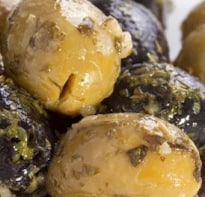Whys and wherefores
Part of the fun of food-aversions chat is trying to explain them. People sometimes deduce that I'm allergic to dairy but I can eat cheese and the likes of gooseberry fool until, ahem, the cows come home. To get to the bottom of it, I call the psychology professor who has all the answers in this field, Paul Rozin of the University of Pennsylvania. Only, it turns out that, as far as most idiosyncratic aversions are concerned (the commonest type of food dislike), there are no answers.Rozin and Jane Kauer, also of Pennsylvania University, are working on a paper that involved surveying nearly 500 people about their hatred of, say, raw tomatoes or white foods. Most had no idea what sparked these aversions, but they tended to have started in childhood.Advertisement
Advertisement
Learning to love thine enemy
When the American food writer, Jeffrey Steingarten, switched careers from law to gastronomy, he felt duty-bound to overcome his many food-hates, which included anchovies, kimchi and Greek food (yes an entire national cuisine). He simply ate and ate and ate these foods until his prejudiced palate relented.There is a well-documented psychological phenomenon whereby "mere exposure" to anything results in an increased liking for it. But when it comes to food, there's also a physiological reason why familiarity increases preference. A study published last month by Dana Small of Yale University has demonstrated this for the first time in humans. "When you ingest something," says Small, "all these hormones are released. Your blood glucose changes, you've all these metabolic effects that are critical for changing the brain's representation of flavour. If you experience a novel flavour and experience positive post-ingestive effects, then the next time you ingest that flavour you'll find it better and will be more likely to eat more of it."Happiness makes food taste better
Never underestimate the positive effects of mood and circumstance. Surely I'm not the only one who has recoiled at the thin, tart-yet-deliciously-cheap local wine on the first night of a holiday, only to be basking in glass upon glass by the end. Exposure + good times = love. Then there was when I met the brother I never knew I had for the first time. He cooked his favourite pasta dish, with about 1,000 olives. I despised olives, but so delicate was the situation that I couldn't possibly let on. By the end of the meal, I bloody loved olives.Advertisement
The third way
Steve Tromans uses a combination of hypnotherapy and neuro-linguistic programming to treat people with extreme aversions, his modus operandi is to get his clients to think the same way as someone who can eat the food in question. "I saw a woman recently," he says, "who had only eaten chips, white bread, strawberry jam, nuggets and burgers since the age of three." She had nearly choked to death around that age. This woman was asked to imagine eating a piece of orange. Impossible, she said. He then asked her to close her eyes and imagine someone across the room eating it. They named her Barb, and she looked just like the client. Tromans suggested other "camera angles" from which to picture this eating - and before the client knew it, she had a Barb's-eye view. "I thought, I'm going to carry on doing this until she realises she is imagining eating it," says Tromans. "By the end of the session she could eat nine different fruits."I recently bit the bullet and sipped some milk to find I didn't even dislike the taste. I still don't like the idea of it, though. Next, I upped the ante with some feta cheese. I got some quality stuff that lacked that rancid punch, and by day three the goaty aftertaste was becoming quite acceptable. Easy. The main challenge is finding the time and inclination to eat stuff you don't fancy. Have you trained yourself out of a food hatred? How did you do it?'I despised olives. But when I met the brother I never knew about for the first time, he cooked his favourite pasta dish with about 1,000 olives. By the end of the meal, I bloody loved olives.' Photograph: Julie Woodhouse/AlamyAdvertisement
For the latest food news, health tips and recipes, like us on Facebook or follow us on Twitter and YouTube.
Advertisement
Tags:
